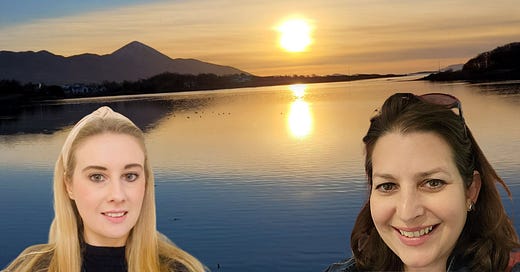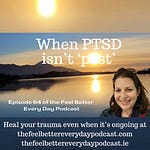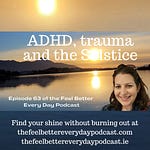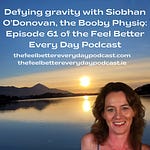For World Digestive Health Day, am delighted to be welcoming Jayne Leonard back to discuss a super simple way (even I’m enjoying experimenting with it) to improve our gut health, ADHD symptoms and mental health.
And Sole to Soul Circle members can join us tomorrow for a deeper dive into getting our inner (and actual) toddlers on board.
le grá (with love),
Evei
Full transcript
… and found that those people who ate 30 or more plant foods a week had a far more diverse gut microbiome.
So that's fruit and veg?
It's actually fruit, veg, grains, nuts, seeds, so just 30 different types a week. So it actually isn't completely out of reach, you know, if you had your porridge with berries and seeds and nuts that's already like four different, four out of your 30 in one meal. It was just very little things, just like a different seed every morning, a different…
Hi, you're listening to the Feel Better Every Day Podcast. I'm Eve Menezes Cunningham and I'm here to help you create a life you don't have to retreat from.
I'm doing this by helping you take better care of yourself. That's the lower case self-care and also that upper case Self: that highest, wisest, truest, most brilliant, joyful and miraculous part of yourself. I do this by sharing trauma-informed and VAST / ADHD-friendly self-care ideas and I would love to hear how you're getting on and what questions you might have.
Today we're working with our digestive health for World Digestive Health Day and I'm delighted to welcome back Jayne Leonard. She specialises in food and mental health.
I hope you find this helpful. And if you want to join the Sole to Soul Circle or if you're already a member, your bonus content this week will be a deeper dive into working with your inner child around pathological demand avoidance when you want to eat healthier but your inner toddler is like, No! And there's also plenty of helpful information for people dealing with actual toddlers. I've just made it all about my own inner toddler.
I hope you enjoy the episode and thank you for listening.
Welcome Jayne, thank you for coming back to the Feel Better Every Day Podcast and this is actually around your specialism because we're celebrating World Digestive Health Day.
Do you want to say a little bit about your background for people who haven't listened to the earlier episodes and where people can find you?
Yeah, so I'm a psychotherapist and nutritional therapist. My interest is in the intersection of the two. Food and mood.
I am currently doing a PhD in how mental health professionals use food and mood research in their whole field called nutritional psychiatry which studies the relationship between what we eat and how we feel. You can find me on my website vivecounselling.com or on LinkedIn or Instagram @vivecounselling.
And that's v-i-v-e? That's v-i-v-e, yeah. Thank you.
If you were to think about your ideal self-care around your own eating and your actual, what would you like to say about that?
Ideally, based on the research, we should be eating 30 different plant foods a week and that's for our gut health, for our digestive health, mental health.
There's been a huge American, the American Gut Project found that those people who ate 30 or more plant foods a week had a far more diverse gut microbiome.
That's fruit and veg?
It's actually fruit, veg, grains, nuts, seeds, so just 30 different types a week. So it actually isn't completely out of reach, you know, if you had your porridge with berries and seeds and nuts that's already like four different, four out of your 30 in one meal.
So it's just varying little things, just like a different seed every morning, a different fruit. But yeah, aiming for 30 over the week.
Wow.
Yeah? So how do you think you do?
Challenge accepted! I think if this were even a few months ago I'd have been like, it's just like not even worth trying. Whereas I think, I'm guessing I'd be probably around 20 because I do have a lot of fruit and veg now and what you're saying with the nuts and seeds. I believe, I no longer think you're an alien for suggesting such a thing, put it that way. I believe it is possible.
I know you like dal, so it's like lentils, garlic, onion.
I made yesterday dal, I had the onion, the garlic, the ginger root, the turmeric root, the coriander, the spinach and the tomato. Would the coconut milk count?
I don't think so, it needs whole foods, so it'd be the whole. Yeah, so that's I think eight, if I counted correctly in one meal.
But then you tend to eat the dal every day for however long. It's about variety, isn't it?
Yeah, well your breakfast, your lunch, your snacks. Yeah, so about 30 plant foods a week.
One helping of fermented food a day as well, for gut health, is what they say is best. So in the future? Yes, kefir, kimchi, miso, sauerkraut. You just have to be careful if you're buying sauerkraut in the supermarket that it's not the pasteurised one, that it's the actual real fermented.
What are vegan options and if possible, what are pepper-free vegan options? This is very much about my allergy, but there'll be other people who are vegan.
Yeah, so some kimchis are vegan. You just have to note to see that it's not the fish.
I know Aldi have one, or Lidl have one that's vegan. Sauerkraut, miso, you can make water, kefir, kombucha.
OK.
Yeah, so most of them, yeah. So I think like about a tablespoon or so a day of sauerkraut or something.
Just a tablespoon? Yeah, I think one tablespoon is one serving.
I mean, I think most people don't even get close to that, so any increase is a good increase.
It's that sense always of, and I think this is an ADHD thing as well. It's like the, well, I can't do it perfectly. I'm not going to bother at all. So a tablespoon feels way more manageable. I was imagining that a whole bowl of it and thinking, Ew.
No, like one to two tablespoons. Yeah. I mean, you know, but beyond two tablespoons, I don't think it's probably a need, but like any, you know, like I said, any change is better than none.
That's the point of the podcast. Something is better than nothing. A teaspoon will be better than nothing, you know, or having it once a week would be better than never having it.
It's, well, whatever feels manageable, you know, you're not trying to be perfect. You're just trying to be, a little bit, make it a little bit easier each time.
I say this now, knowing that I rarely do this myself with the healthy foods, even though I have the best intentions, but definitely make the 30 different plant foods. So they would be two things. And then the other thing I would say is ultra processed foods. To really watch those.
Yeah. I know. They're just kind of coming out now as being pretty bad for gut health and overall health and mental health as well.
Big links between that.
So I'd say if you have them, have them intentionally, you know, rather than, because we can have like an ultra processed pasta sauce and not realise it's actually maybe not as good as we think ourselves, whereas at least if you're going to have something ultra processed, at least recognise what it is and that you're having it as a treat rather than, you know, putting them into your day. Yeah.
I, when I started seeing the medical herbalist, Colleen, she was a guest a few weeks ago and it was a good few years ago now, maybe four years ago, but I was actually celebrating my Denny's anniversary of like a year of Denny's vegan sausages every day because they were so delicious.
She was horrified. And it's like as a treat, but not as a yeah.
Yeah. A lot of the vegan food is very ultra processed. Yeah.
And do you use the Yuka app?
I don't. I tend to make most of my stuff from scratch or I just quickly check the label. I tend to just buy the whole food. So I don't, but I know I've had lots of clients say it's been very helpful. I know you've said it's very helpful. Yeah.
Just thinking like, even in terms of like, say making dal, the first time I was using the app, most of the coconut milk tins I was picking up were containing hazardous, risky additives. That's the thing I'm seeking to avoid.
But like some of the ultra processed vegan stuff, it shows up well on the Yuka app in terms of nutritional value and others, terrible. And it's really like even within the same brands, different products, either. And it's really like I wouldn't have the bandwidth or the brain to be navigating the labels. So yeah.
Yeah. And I would say with labels, it's, you know, like a shorter label or foods you can recognise tend to be, but that's just a general rule of thumb. But yeah.
And with the coconut milk, you can replace it with, you know, the block. I got organic, it was OK.
Oh yeah.
Sorry, do you mean like the decimated coconut?
No, you can kind of get, is it cocoa butter? It's a little cocoa butter. It's a little block. Oh, you can get it in the health food store.
I need to figure out what it is. It will come to me, but you can just kind of like grate it up. Yeah.
I think it is. I want to say the decimated or desecrated coconut. My grandmother used to use it.
But I can't remember. Clearly it's not like unsacred. Yeah.
So that's one workaround. Yeah. And the organic one was good.
Yeah. But sorry, I'm interrupting you.
No, you're fine.
Anything else for your ideal for all of us and for yourself?
I think that would be if, I mean, I think we'd be doing amazingly if we could all do that, if we could get ultra processed to like, you know, 20% ultra processed. So that's, you know, those kinds of highly processed foods or that you said have lots of additives like emulsifiers now are being thought to be pretty unhealthy for the gut. They might increase the permeability of the gut and damage the balance of the microbiome.
But they're also quite high in sugar, which is the bad bacteria. And they are very low in fibre. The fibre is usually stripped out, which of course we need fibre to feed the good probiotics.
Yeah.
In terms of your actual, because I know you're looking amazing and sounding amazing, but you're also in a tumultuous time with lots of house moves and like you're doing amazingly.
What is your actual essential daily self-care around food and your own gut health?
Yeah, it could be better at the moment. Like you said, things are very hectic, but I do try to eat, you know, I think I've said this the last podcast, like something protein-y.
I usually just have nuts or seeds or something first thing in the morning. And I try and just keep it really, really simple. Oat cakes with hummus and tomatoes and, you know, some spices or herbs, you know, that's kind of already three things, you know, three of my 30.
Just very, very simple things, but that are not usually processed or like rice cakes with a hundred percent peanut, peanut butter or almond butter and banana and cinnamon. Yeah, just trying to keep it really, really simple. But recognising that, okay, yeah, I could have the really fancy, lovely, tasty thing, but actually really tasty too.
And you do notice that when you start cutting out all the processed foods, regular foods do taste better.
Yeah. Yeah.
Because we've been conditioned and I'm also remembering you're gluten-free as well as being vegan. Like, so you've got extra challenges around.
Well, very low gluten. Yeah. But I do eat sometimes because I'm not coeliac, but I do have gluten intolerance, but yeah. So it is, but I suppose I'm used to it now.
Yeah. And you mentioned, I've heard that a few times about the importance, especially with ADHD brains for like protein. And I'm thinking I've got a little bowl of nuts next to the kettle for easy access, which I walked straight past this morning and I haven't had breakfast yet.
I've been up for hours. And some people have said that it's important to eat first thing. And then other people talk about like intermittent fasting and I tend to think, Oh, I'll eventually eat when I remember to eat, which I realise is probably not what you're going to say is ideal.
I don't know. I mean, I suppose it's, it is kind of individual. I wouldn't previously, even when I, I still do, I still eat when I feel like eating, you know, I just look at breakfast is when you break your fast rather than to be at 8am or 7am or whatever.
But yeah, intermittent fasting, the research is interesting. I think it's more persuasive for men than it is for women because of hormonal fluctuations and things with ADHD as well. It may not be the best option or maybe that you do your kind of fasting window from morning till afternoon, particularly if people are on medication, they probably do need to eat before they take their medication because that suppresses them.
Yeah, I mean, I have worked with people who do intermittent fast, but we've looked at kind of adjusting the fasting window and that seems to work better.
And again, to be clear, I'm not actually intermittent fasting. I'm just randomly picking something and thinking, well, maybe what I'm doing that everyone's telling me is bad is fine because other people deliberately don't eat for that length of time.
But I'd love if you could say something. First of all, is there anything else that is an essential for you, especially in turbulent times?
For me, I suppose it's nature as well, time outside in nature among the trees. And that's obviously really good for gut health as well. And there's lots of microbes all around us that we should be absorbing and digging in the soil and stuff. I haven't had a chance to do that in a while, but in nature as much as I can.
Yeah, wonderful. And what would you like to say about sensitive nervous systems and trauma and ADHD and gut health, if anything?
Yeah, so I suppose there's a link between trauma and digestive issues, IBS and irritable bowel syndrome and inflammatory bowel disease. And there's also a link between ADHD and IBS. So I don't know that they fully know why, but obviously the gut microbiome is being investigated as a link and there is a link between ADHD and gut health as well.
They're looking at that.
I think it probably is about improving gut health through diet and maybe probiotic supplementation, maybe more time in nature, more exercise, managing stress. And there is research that when we do that, ADHD symptoms can improve.
And I mean, you're saying that it's like, of course, and the Rest Digest response, parasympathetic activity, it's so important. And then it's so much easier said than done.
What helps you reduce stress? I know you've said a few things and you seriously revolutionised my life when I interviewed you the first time. Like yesterday, I had a friend over making dal and pilau rice.
And it was like, yeah, it was stressful trying to navigate the attention and focus and getting distracted. But thinking, I can't believe how much I've come to love cooking, because I decided to reframe it as part of my self-care, that nourishing myself.
And I have actually forgotten what I was asking you.
Other things to reduce stress that I do. Maybe try the breakfast. Yeah, I suppose nature is my biggest one. I love being outdoors. And even just, you know, there is again, lots of studies that say nature is great for trauma, great for anxiety, great for depression, for ADHD symptoms, because that's how we're meant to live.
It really grounds me, makes me feel mindful. It switches off my brain. And presumably it helps my gut health.
And like you said, cooking as well is, I find it very, very mindful. I get into the flow. And, you know, so it's like, that's just what I'm doing.
That one thing.
And can you remind us, for people who haven't listened to your first interview on the podcast, like I'm listening to you now. And it's like, I'm going to do, oh, the batch cooking.
I am doing much more batch cooking. But I realised that my brain, I realised that is a symptom. It's like, I'm going to spend a whole day doing like a month's worth. And that just isn't realistic with my schedule. How do you navigate, because you've got kids as well, like how do you navigate the actual cooking in a sustainable way?
I think just keep it simple. You know, like I said, I like, you know, you see all the Instagram meals and they look amazing and they're great and they are fabulous.
But they're really, you know, they can be really overwhelming as well for anyone, for busy people, anyone.
But if you've ADHD as well, or trauma or anxiety or depression, like that's really overwhelming to gather all these different ingredients and prepare it all and do 25 steps. I think it's lovely for a special occasion, but I do think, and I've had this conversation with clients before, when we look back on how our grandparents ate and our parents would have eaten, and they were, you know, probably much healthier than us in terms of like food related illnesses.
And the soil would have had more nutrients back then as well.
Yeah, for sure. And more, the food had more flavour back then because of the way bread and the soil.
But they ate much simpler food. It was just a focus on what's in season, what's, you know, whole foods. And that's what I do.
I just keep it really, really simple. I don't do hugely fancy. I use a lot of herbs and spices and things, but I'm not, you know, I'm not spending hours every day making dinner at all.
Well, for the bonus content for the Sole to Soul Circle members, I'd like to talk to you about self-care and nutrition for our inner children, like, and actual children as well, where appropriate. But I wondered, just for this conversation, what are your thoughts around working metaphorically, like when we have an upset stomach, when we have, when there's a lot going on that's stressful and we're struggling to digest life? Like, do you work metaphorically with the gut as well as physiologically?
Probably not as much as you would, I would think. Not so much. I would, I mean, I would always encourage people to listen to their gut. I mean, that's, I'm huge on that, huge on that coming from the trauma background. I don't know, do I do it so metaphorically? But for sure, listening to it, what's it saying? If it's upset, that that's meaning something.
If it's telling you this is not, yeah, there's a problem that that's, you know, we need to listen to that. But I don't think I do it in the same way you do.
I was just curious. And I'm also, I want to be really clear, if you've got gut issues or any health issues, I think metaphorical work is amazing, image work, all of it. And see a doctor, see a doctor, see a doctor, see a doctor. Absolutely.
Yeah, for sure.
Thank you so much for this conversation. And can you remind listeners again where they can find you? Yeah, so at my website, vivecounselling.com, V-I-V-E, and Instagram and LinkedIn at Vive Counselling.
Thanks a million.
Thanks, Eve.
Thanks again for listening to the Feel Better Every Day Podcast.
For deeper dives into each episode and bonus content interviews with my guests, as well as access to the whole archive, including the entire Love Your Whole Self chakra journey, you can join the Sole to Soul Circle. You might also enjoy the book 365 Ways to Feel Better: Self-care Ideas for Embodied Wellbeing. And you can find out more about all the offerings at selfcarecoaching.net and the feelbettereverydaypodcast.com. Have a gorgeous week.
This episode, like all episodes, has been produced by me, your host, Eve Menezes Cunningham. Take care.














Share this post